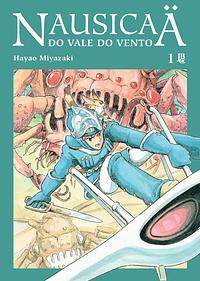Take a photo of a barcode or cover
Beautiful. After watching the movie, I'm grateful for a deeper dive into this fascinating story from one of my favorite creators.
Just getting started! Excited to continue the series- it’s giving me Ferngully vibes.
I am not very good at reading graphic novels, but I did enjoy this one! I think it has a lot of interesting plot points and imagery and it was fun to read. Honestly, the star-rating is based more on my inability to read graphic novels...
Temporary DNF, will come back to it.
adventurous
dark
hopeful
mysterious
tense
medium-paced
Plot or Character Driven:
Plot
Strong character development:
No
Loveable characters:
Yes
Diverse cast of characters:
No
Flaws of characters a main focus:
Yes
In the 80s, manga was just starting to take off. It was a golden decade full of experimentation, and during this time, manga drew heavy influence from western culture, such as American comics, Disney, and classic genre books. Nausicaä was no exception, and it was one of the first series to heavily impact animanga's future identity.
However, "identity" is where this manga suffers its biggest downfalls. It lacks a solid identity in two areas, the first being genre. Nausicaä is unsure of what it wants to be: a post-age sci-fi adventure, or a traditional fantasy with knights and supernatural powers. While sci-fi and fantasy tend to be compatible, their relationship has to be symbiotic, not competitive, in order for an author to achieve success. You cannot have a scene reminiscent of Hobbits drinking together at a pub, and then transition to some epic battleship rumble. While it's fun to see at the outset, this sort of jarring technique results in a messy manga that never settles down to properly develop an arc. Miyazaki clearly wanted to write two separate stories, but between the genre clash and the mangaka's constantly shifting focus, the world of Nausicaä quickly loses its initial punch.
The second major lack of an identity is within the story itself. While the manga's artwork is something to behold, don't let the visuals fool you. There isn't much here in the way of events that you haven't already seen done better by other fantasies or sci-fis. This story inculcates the sort of camaraderie and superstitious traditions found in old fantasy books like Beowulf, Homer's Odyssey (which is where the name "Nausicaä" and some of this manga's themes are derived from), and Lord of the Rings, but with the veneer of space operas like Dune. It sounds really cool on paper, but in practice, Miyazaki fails because he expects the hero's journey, the strange planet, and the lifted character archetypes to be the binding force that keeps us reading. There is not enough of Miyazaki's own story holding things together, though if Chosen One princess power trips are your thing, then this may be just for you.
Nausicaä herself, princess of the valley, suffers from a condition known as M.S.S., or Mary Sue Syndrome. This incurable disease has affected many a character far and wide, rendering them unrealistic dullards that are perfect in every way. What's that, you say? It's good to make a character more human by having them fail and grow? Giving them complex motivations and not just magically helping them through every conflict paves the way for character development? Nah, screw all that. See, this princess is a badass, a healer, a wielder of ultimate might, and an ally of Deus Ex Machina. And selfless, too. A selfless army of one. Who could ask for more?
I won't deny that this manga sets the stage for Miyazaki's Studio Ghibli films, though as the prototype for said films, Nausicaä is a very weak product. When held up to its own source material, it becomes flat and unoriginal, sharing typical flaws with modern fantasy and sci-fi such as length, derivative world-building, two-dimensional characters, and copied ideas. I suppose when you can draw stunning visuals, it's easy to get lost in the creation of a world and fail to include anything compelling or different within the story. It's too bad, because Nausicaä showed a lot of promise, but its potential was never met.
However, "identity" is where this manga suffers its biggest downfalls. It lacks a solid identity in two areas, the first being genre. Nausicaä is unsure of what it wants to be: a post-age sci-fi adventure, or a traditional fantasy with knights and supernatural powers. While sci-fi and fantasy tend to be compatible, their relationship has to be symbiotic, not competitive, in order for an author to achieve success. You cannot have a scene reminiscent of Hobbits drinking together at a pub, and then transition to some epic battleship rumble. While it's fun to see at the outset, this sort of jarring technique results in a messy manga that never settles down to properly develop an arc. Miyazaki clearly wanted to write two separate stories, but between the genre clash and the mangaka's constantly shifting focus, the world of Nausicaä quickly loses its initial punch.
The second major lack of an identity is within the story itself. While the manga's artwork is something to behold, don't let the visuals fool you. There isn't much here in the way of events that you haven't already seen done better by other fantasies or sci-fis. This story inculcates the sort of camaraderie and superstitious traditions found in old fantasy books like Beowulf, Homer's Odyssey (which is where the name "Nausicaä" and some of this manga's themes are derived from), and Lord of the Rings, but with the veneer of space operas like Dune. It sounds really cool on paper, but in practice, Miyazaki fails because he expects the hero's journey, the strange planet, and the lifted character archetypes to be the binding force that keeps us reading. There is not enough of Miyazaki's own story holding things together, though if Chosen One princess power trips are your thing, then this may be just for you.
Nausicaä herself, princess of the valley, suffers from a condition known as M.S.S., or Mary Sue Syndrome. This incurable disease has affected many a character far and wide, rendering them unrealistic dullards that are perfect in every way. What's that, you say? It's good to make a character more human by having them fail and grow? Giving them complex motivations and not just magically helping them through every conflict paves the way for character development? Nah, screw all that. See, this princess is a badass, a healer, a wielder of ultimate might, and an ally of Deus Ex Machina. And selfless, too. A selfless army of one. Who could ask for more?
I won't deny that this manga sets the stage for Miyazaki's Studio Ghibli films, though as the prototype for said films, Nausicaä is a very weak product. When held up to its own source material, it becomes flat and unoriginal, sharing typical flaws with modern fantasy and sci-fi such as length, derivative world-building, two-dimensional characters, and copied ideas. I suppose when you can draw stunning visuals, it's easy to get lost in the creation of a world and fail to include anything compelling or different within the story. It's too bad, because Nausicaä showed a lot of promise, but its potential was never met.
adventurous
tense
medium-paced
Plot or Character Driven:
A mix
Strong character development:
Yes
Loveable characters:
Yes
Diverse cast of characters:
Yes
Flaws of characters a main focus:
No
A really strong start. I'm not the biggest fan of manga, but this one seems really good. If you liked the movie (like me) this seems like it just gives you more of the details of the epic story that the movie only scratches the surface of.
adventurous
mysterious
reflective
fast-paced
Plot or Character Driven:
A mix
Strong character development:
No
Loveable characters:
Yes
Diverse cast of characters:
No
Flaws of characters a main focus:
No
This book should probably read with all the other as by itself, it doesn't complete any storyline.
adventurous
inspiring
mysterious
reflective
tense
medium-paced
Plot or Character Driven:
Plot
Strong character development:
Complicated
Loveable characters:
Yes




